Imperialism by the Book
Members of the Dollars & Sense collective review new and classic books on empire.
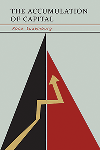 The Accumulation of Capital
by Rosa Luxemburg (1913; Martino Fine Books, 2015,
a reprinting of the 1951 English edition).
The Accumulation of Capital
by Rosa Luxemburg (1913; Martino Fine Books, 2015,
a reprinting of the 1951 English edition).
In The Accumulation of Capital, the Marxist theorist and revolutionary Rosa Luxemburg tackles a central problem of capitalism: The value of the goods workers produce is greater than that of the goods they consume. Then where does the spending necessary to absorb this surplus value come from? If from capitalist investment in new factories, machinery, etc., then won’t that just end up producing more goods—kicking the can of worms down the road, but making it larger in the process?
Luxemburg insisted that capitalist accumulation was impossible without demand from non-capitalist areas—hence, for example, the imperialist drive for captive markets. She saw the forcible extension of capitalist economic relations to new realms (“primitive accumulation”) as a central process running through the history of capitalism.
Some Marxist economists insisted that Luxemburg was wrong about capitalism’s need for outside demand—that it was possible for capitalist economies to grow demand in tandem with supply. They were right on that score, at least in the realm of mathematical models. Some of her critics seemed to argue, however, that the generation of enough demand to absorb the full value created by labor was basically unproblematic. On this, they were spectacularly wrong. Luxemburg was right that this is an Achilles heel of capitalist growth.
In her introduction to the 1951 English edition of The Accumulation of Capital, economist Joan Robinson credits Luxemburg for grasping the centrality of territorial expansion to capitalist development (noting that even mainstream economists accepted this view).“But the academic economists are being wise after the event,” Robinson notes. “For all its confusions and exaggerations, [Luxemburg’s] book shows more prescience than any orthodox contemporary could claim.” —AR
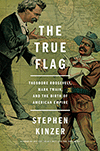 The True Flag: Theodore Roosevelt, Mark Twain, and the Birth of American Empire by Stephen Kinzer (Henry Holt and Co., 2017).
The True Flag: Theodore Roosevelt, Mark Twain, and the Birth of American Empire by Stephen Kinzer (Henry Holt and Co., 2017).
Every page of Stephen Kinzer’s new book on the internal political debate over the Spanish American War is a mosaic of the words of others, and this is a great strength. Kinzer grants us a front-row seat from which to observe the debate over whether or not the U.S. should go to war with Spain in 1898 and then, once Spain was defeated, whether or not the U.S. should keep hold of conquered territories as colonies. Senator George Frisbie Hoar (R-Mass.) asked his colleagues, “Have we the right, as doubtless we have the physical power, to enter upon the government of ten or twelve million subject people without Constitutional restraint?” His answer was unequivocally no. But Senator Orville Platt (R-Conn.) challenged, “The literal application of the Senator’s doctrine would have turned back the Mayflower from our coast and would have prevented our expansion westward to the Pacific Ocean.” Kinzer’s sympathy is clearly with the anti-imperialists, which leads him to the error of calling the Spanish American War the “birth” of American Empire. The white male anti- imperialists of that time presented expansion as a departure from American norms, describing it as a repeal of the Declaration of Independence. Of the anti-imperialists Kinzer chooses to quote, only Booker T. Washington, Ida B. Wells, Jane Addams, and a group statement from “the colored citizens of Boston” managed to frame imperialism as a continuation of existing American practice and also morally indefensible.
The imperialists, meanwhile, saw annexation of Puerto Rico, Cuba, Hawaii, and the Philippines as a logical and desirable continuation of the Louisiana Purchase, Indian removal, and the Mexican American war. President McKinley was among those who purposefully used the term manifest destiny to make the link. They used those earlier expansions and subjugations as a model and justification for domination of islands and peoples in the Caribbean and Pacific. (For example, General Elwell Otis “urged the Filipinos to ‘be good Indians.’”) They were wrong, of course, about the morality of those actions. Still, Kinzer does us the great service of showing that U.S. imperialism is always up for debate and its continuation is not a foregone conclusion. —ZS
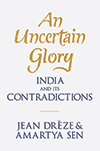 An Uncertain Glory: India and Its Contradictions by Jean Drèze and Amartya Sen (Princeton University Press, 2013).
An Uncertain Glory: India and Its Contradictions by Jean Drèze and Amartya Sen (Princeton University Press, 2013).
Written by economics Nobel laureate Amartya Sen and his frequent collaborator Jean Drèze, this book skillfully analyzes the paradoxes of modern India, the world’s largest post-colonial country and one of its fastest-growing economies. Drèze and Sen evaluate India’s successes and failures in areas ranging from gender equality and literacy to public health. Elites have used their disproportionate influence in government and the media to block needed reforms and to pass pro-corporate policies at the expense of the worst-off. Still, reformers and activists can draw on India’s greatest resource—democracy—to make the country fairer and more prosperous. Drèze and Sen’s sharp study demonstrates that development that does not ultimately serve human freedom is no development at all. —WW
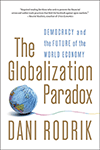 The Globalization Paradox: Democracy and the Future of the World Economy,
by Dani Rodrik
(W.W. Norton & Co., 2012).
The Globalization Paradox: Democracy and the Future of the World Economy,
by Dani Rodrik
(W.W. Norton & Co., 2012).
In The Globalization Paradox, economist Dani Rodrik provides a thoroughgoing and engaging critique of the economic orthodoxies of extreme globalization, or what he calls “hyperglobalization.”
The heart of Rodrik’s analysis is his “trilemma” of globalization. “We cannot have hyperglobalization, democracy, and national self-determination all at once,” Rodrik argues. “We can have at most two out of three.” Globalization strategies must “restrict democracy,” or “limit globalization,” or “globalize democracy at the cost of national sovereignty.” (Emphasis in the original.) Today neoliberal policies favor hyperglobalization at the expense of democracy or national sovereignty, or both. For Rodrik, China, which “has opened a window to the world economy, but kept a screen on it,” offers the strongest argument against that reigning neoliberal orthodoxy.
Along the way, Rodrik offers powerful criticisms of free trade policies (which have large negative distributional consequences), financial liberalization (which has left countries prone to financial crises), and hyperglobalization policies (which have eroded labor standards, health and safety standards, and environmental standards).
In one particularly devastating critique, Rodrik calculates that if the United States embraced complete trade liberalization, this “would reshuffle more than $50 of income among different groups for each dollar of efficiency or ‘net’ gain created!” In Rodrik’s view, the purpose of free-trade policies is not to divide the small net gain among us all, but rather to enrich the free-trade “winners,” by many times that efficiency gain, at the expense of the distributional “losers.”
Rodrik is not an advocate of foregoing globalization altogether, but rather he asks to what degree and in what manner any nation should engage with the global economy. —JM
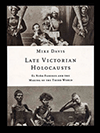 Late Victorian Holocausts: El Niño Famines and the Making of the Third World
by Mike Davis (Verso, 2000).
Late Victorian Holocausts: El Niño Famines and the Making of the Third World
by Mike Davis (Verso, 2000).
Using a mix of political economy and environmental history, Mike Davis brings to light one of the darkest episodes in modern history. In the second half of the nineteenth century, El Niño weather variations produced droughts across that world that indifferent colonial administrators, free-market fundamentalism, and unequal trade treaties turned into famines in India, China, and elsewhere. European imperialism was to blame. The consequences were devastating: millions died avoidable deaths, and the global North impoverished the global South. Davis’s groundbreaking story is essential reading for understanding how people, ideas, and institutions, not nature alone, have structured poverty and prosperity today. —WW
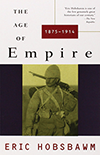 The Age of Empire,
1875-1914, by Eric Hobsbawm (Widenfeld & Nicolson, 1987).
The Age of Empire,
1875-1914, by Eric Hobsbawm (Widenfeld & Nicolson, 1987).
This classic work by a renowned Marxist historian remains a brilliant portrait of Europe, the wider world, and how the two were bound together by empire. Hobsbawm weaves together many themes into a coherent and compelling narrative: the expansion of global capitalism, the politics of nationalism and democracy, demographic and social changes, the workers’ and women’s movements, the arts and sciences, and the intrigues of politicians and diplomats. Without sentimentality, he shows that liberal domestic orders could go hand-in-hand with atrocities abroad. Despite the big changes of the twentieth century, the world he depicts resembles our own. —WW
 King Leopold’s Ghost: A Story of Greed, Terror,
and Heroism in Colonial Africa,
by Adam Hochschild (Houghton Mifflin, 1998).
King Leopold’s Ghost: A Story of Greed, Terror,
and Heroism in Colonial Africa,
by Adam Hochschild (Houghton Mifflin, 1998).
Hochschild tells a powerful story about perhaps the most awful colonial regime in modern times. Even as Britain and France scrambled to expand their empires, the king of tiny Belgium personally ruled an area of central Africa that was eighty times Belgium’s size. Leopold II and his agents extracted rubber and other resources for decades with slave labor, killing perhaps 10 million Congolese. Hochschild follows these imperialists as well as the people who opposed them, from Belgian socialists and English abolitionists to African rebel leaders. The result is both a sobering history of how colonialism has influenced modern Africa, and an inspiring reminder of how many people have struggled to overcome empire’s legacies. —WW
Did you find this article useful? Please consider supporting our work by donating or subscribing.
